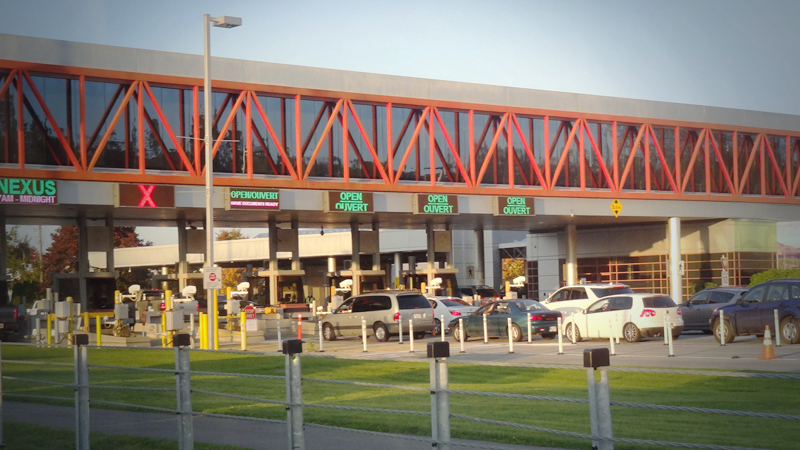Trump, Trudeau agree to close U.S.-Canada border to 'nonessential' traffic

The United States and Canada agreed to close their 5,500-mile-long border to nonessential traffic Wednesday, a drastic measure that officials hope will help stanch the spread of novel coronavirus in both countries.
President Donald Trump and Canadian Prime Minister Justin Trudeau made the decision to close the border Wednesday morning, Trudeau said at a news conference. People will no longer be able to traverse between the two countries for recreation and tourism, Trudeau said. It was not clear when the border may reopen.
"In both our countries we're encouraging people to stay home," Trudeau said. "We're telling citizens not to visit their neighbors unless they absolutely have to. Well, this collaborative and reciprocal measure is an extension of that prudent approach."
Trudeau spoke after President Trump tweeted the plan to close earlier Wednesday.
Trudeau and Vice President Mike Pence said essential travel, including for employees who live on one side of the border and work on the other, will continue. Trade and trucking will not be affected.
Pence said at a White House news conference that the closure was decided after "mutual discussion" between the two governments. The Department of Homeland Security will ensure that it remains closed to nonessential traffic, Pence said, while ensuring critical personnel and goods do still enter the United States.
In 2018, goods and services trade amounted to an estimated $718.5 billion, according to U.S. figures.
"Our governments recognize that it is critical that we preserve supply chains between both countries," Trudeau said, to "ensure food, fuel and lifesaving medicines" are able to move between the U.S. and Canada.
Trudeau also announced a $27 billion program to directly support Canadian families and businesses affected by the virus, and an additional $55 billion in aid through tax deferrals.
Trudeau spoke in Ottawa, where he is working in isolation as his wife, Sophie, recovers from covid-19.
Canada has confirmed around 600 cases of the coronavirus, according to a count kept by the Johns Hopkins University. At least eight people have died. The United States has confirmed more than 6,400 cases, with cases in all 50 states and the District of Columbia. More than 110 people have died.
Trudeau announced the closure of Canada's borders to most travelers Monday, but exempted U.S. citizens, Canadian citizens and permanent residents.
The closure will have a major impact on one of the world's busiest border crossings, where people travel back and forth each day for work, to see family, or to shop or dine.
U.S. residents spent more than $6 billion in Canada in the first three quarters of 2019. Last December alone, more than 2.3 million vehicles entered Canada from the United States. More than 1.6 million were Canadian vehicles returning to the country.
The Detroit-Windsor tunnel, which 4.2 million vehicles used in 2019 to shuttle between downtown Detroit and Windsor, Ontario, will close to nonessential traffic. Many health care workers in Detroit live in Canada.
Christopher Sands, director of the Center for Canadian Studies at the Johns Hopkins School of Advanced International Studies, said it is important that the decision to close the border was joint, unlike Trump's decision to halt travel from China and Europe.
"With Canada, even though Trudeau and Trump have been not exactly best of friends, the system to some extent worked," he said.
In Derby Line, Vermont, where the Haskell Free Library and Opera House sits on top of the border - half of the building is in Canada, the other half in the United States - the closure will mean that people cannot grab a pizza in Canada and bring it home to Vermont, and that family members will be unable to pop across the border and say hello. For residents there, Canada is the same street: Main Street in Derby Line turns into Main Street in Stanstead, Quebec.
Ed Jenness, 70, lives a half mile from the Canadian border in Derby Line. His wife's family lives just across the border, and the couple enjoys going out to dinner in Sherbrooke, Quebec, about an hour away. Some people go to church in Canada, he said, and won't be able to do so Sunday.
Jenness owns Walt's Sales and Service in nearby Derby, which sells lawn mowers, all-terrain vehicles, snow machines and other equipment. His wife spent Wednesday furiously wiping down counters with disinfectant wipes because of coronavirus and Jenness, who has heart issues, tried to stay as far from customers as possible.
He doesn't expect to take much of a direct financial hit from the closure because he cannot sell in Canada, but foresees that the region's bars and restaurants - which as of Wednesday remained open despite orders in other parts of the country to close - will be severely impacted by the loss of Canadian customers.
"There will be a trickle down, and we will feel it. Our economy will go to hell," he said. "And up here in northern Vermont, we don't have much of an economy."
